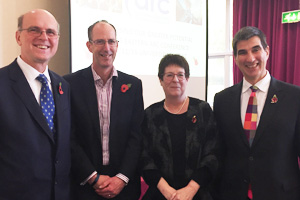
From left: Professor Philippe De Wilde, Deputy Vice-Chancellor Research and Innovation, University of Kent, Professor David Richardson, Vice-Chancellor of the University of East Anglia, Professor Dame Julia Goodfellow, Vice-Chancellor of the University of Kent, and Professor Anthony Forster, Vice-Chancellor of the University of Essex.
Essex academics joined colleagues from East Anglia and Kent universities for a special conference to mark the end of the first full year of the Eastern Academic Research Consortium (Eastern ARC).
Proposed in 2014, Eastern ARC was created to strengthen current collaboration and develop new cross-disciplinary research between the three member universities.
Each partner in the Consortium acts as lead in one of three areas:
• Quantitative Social Science, led by the University of Essex
• Digital Humanities, led by the University of Kent
• Synthetic Biology, led by the University of East Anglia (UEA)
Held at the University of Kent, guests included the Vice-Chancellor of Essex, Professor Anthony Forster; the Vice-Chancellor of the UEA, Professor David Richardson, and Professor Philippe De Wilde, Deputy Vice-Chancellor Research and Innovation, at Kent.
Leading academics in each area updated their colleagues about the joint progress made in the first year, and their ambitions for the future.
Notable Eastern ARC achievements in the last 12 months include Essex’s Dr Federica Genovese’s publication on European monetary policy and social unrest, which received significant media coverage, and UEA’s Dr Chidiebere Ogbonnaya’s work on how actions such as wage and employment freezes taken to combat recessions may compromise workers’ well-being and performance.
Eastern ARC Synthetic Biology Fellow Bern Miller was awarded the Gen9 Prize for Synthetic Biology in July 2016. Kent’s Dr Benjamin Vis has also been successful in securing Research Council funding to bring together an international network of academics interested in exploring approaches to sustainable urban planning: the TruLife network.